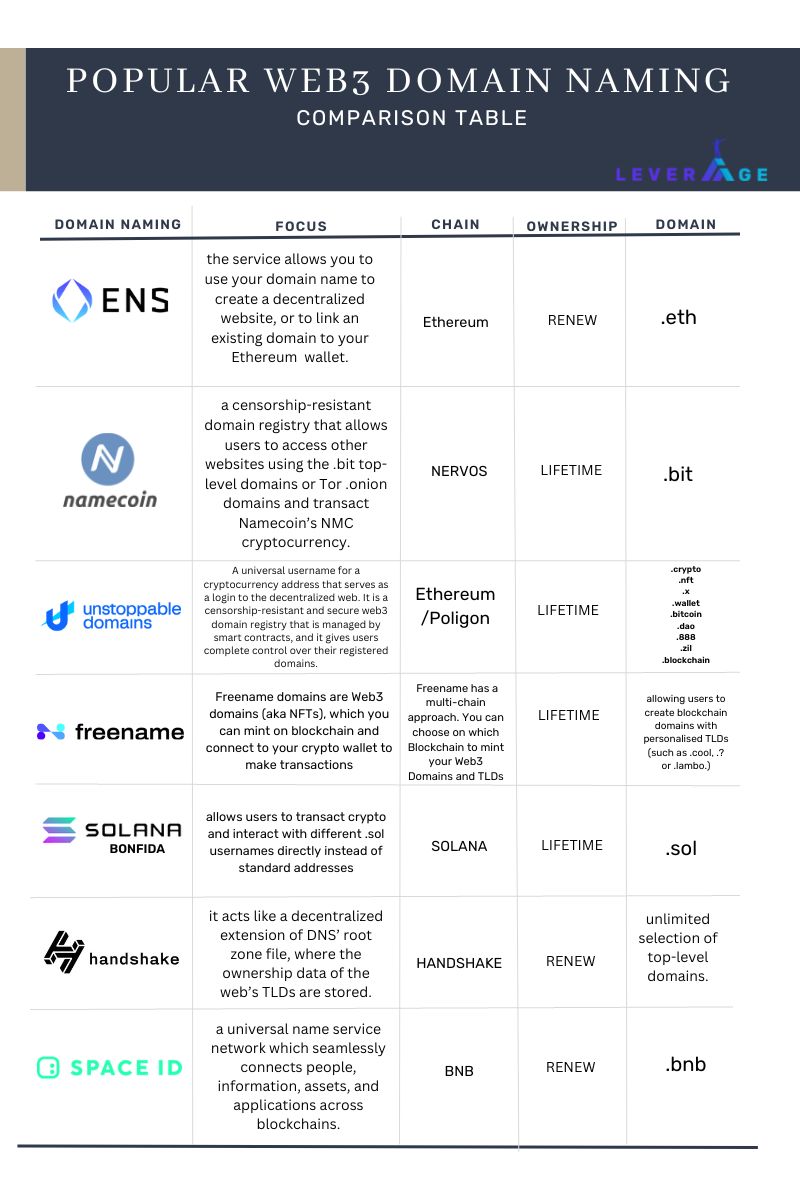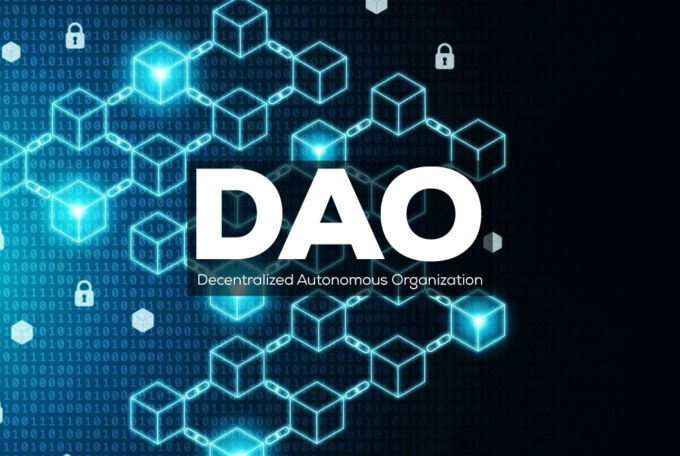What are Web3 Domains
Web3 domains are the blockchain equivalent of a Domain Name System (DNS) address, which is how we commonly access websites such as theleverage.net on the internet. Web3 domains use blockchain technology to make domain name registration and resolution completely on-chain. Users are able to register unique, easy-to-remember domain names which can replace their wallet addresses and decentralized websites (DWebs). Registering a Web3 domain would require a registrar such as Ethereum Name Service (ENS) and Unstoppable Domains.
Web3 domains will be decentralized, meaning that no one person or entity controls them. They are also censorship resistant because they are hosted across thousands of computers around the world instead of being controlled by one centralized server like traditional web domains were before them.
Web3 domains are stored in a wallet by the owner, much like cryptocurrency. They cannot be seized or taken away from you by any third party. You can easily manage your domain and add features such as crypto addresses and point content to your domain. Additionally, Web3 Domains can be transferred around the world in seconds without needing permission from a third party.
No Governance, No Whois
As public blockchains are not regulated under ICANN or any other international governance, there is no registrant data available to right holders. An NFT domain gets assigned to a crypto wallet. The owner information is simply the 42-digit code of the owner’s wallet. As there is no authority controlling the NFT-Domain market, you may also choose to sell the domain name at any time. Currently, none of the smart contracts prohibits selling or licensing use to third parties.
Fees
You do not own a regular domain name in the Domain Name System. To keep your right to use the domain, it must be renewed annually with payment of a renewal fee. If the fee is not paid, the domain is released again and can be registered by another person or entity. In a blockchain-based system, it is registered forever and for most Web3 domains there are no annual fees.
Are Web3 Domains NFTs?
Web3 domain names are a subcategory of Non-Fungible Tokens (NFTs). They are verified digital assets on a blockchain with an ownership certificate, which can be traded on NFT marketplaces.
Types of Web3 Domain Extensions:
Web3 domain names typically refer to the suffix in a URL. For example, john.wallet has the .wallet extension. Extensions can be geared toward specific communities, such as .nft for NFTs and .bitcoin for Bitcoin users. However, you can register a domain with whichever extension you like.
Here are some examples of popular WEB3 domain extensions:
- .888
- .eth
- .bitcoin
- .blockchain
- .coin
- .crypto
- .dao
- .nft
- .wallet
- .web3
- .x
- .zil
Uses of Web3 Domains:
- Alias for wallet code – In the Web 3.0 world you may want to send crypto currency to another wallet. Each crypto wallet address is a 42-bit long complex alpha-numeric string like “1A1zP1eP5QGefi2DMPTfTL5SLmv7DivfNa”. With NFT domains it is possible to replace or translate this string with a more memorable name like questel.nft, which is easier to remember and reduces the risk of payments being made to the wrong wallet in error
- Building your digital identity – A decentralized domain can be linked to anyone’s personal information, past credentials, achievements, social interactions and more. Since the individual owns the domain completely, they can provide this as proof of who they are. All of this comes as a major improvement over today’s state of affairs, where every major service provider requires its users to create a unique profile with different usernames and passwords. A user might have to keep track of a variety of login credentials as more and more services pop up all the time; these credentials also generally don’t carry over any history or credentials when moving from one platform to another. One’s reputation on Instagram has no inherent merit when signing up with Twitter or Facebook. Multiple apps are already using NFT-based domains as a way of logging users in, and Twitter supports associating an NFT with a username
- Decentralized websites – Decentralized websites are websites hosted on blockchains, rather than on traditional servers. They use the Interplanetary File System (IPFS) protocol, which stores data in a decentralized manner across the blockchain, rather than storing it all on a central server like traditional websites do. Currently, only the Brave and Opera browsers support this protocol natively; however, it is likely that other browsers will add this functionality in the future
- Sending encrypted and private mails – Web3 domains can provide an effective way to send and receive emails privately, and even encrypted email. By linking your Web3 domain to a private email client, it’s possible to add an additional layer of security to your existing Gmail or Outlook address, where new emails are forwarded through the private email client that is linked to your domain and into your personal inbox
- For education credentials – For the field of education, verifiable credentials can streamline the process of tracking student progress, making it unfalsifiable. Grades, extracurricular activities, awards and much more can all be recorded as they are achieved and remain with that individual forever. Updates to the data could be automatic, so students don’t need to build out a list of proven documentation in anticipation of college or other higher learning
- A digital business card – Digital business cards could be an essential component of a digital identity. A domain, linked to a person’s digital identity, can act as their business avatar, much in the way a physical business card reveals essential information, and nothing more. Potential employers or partners could get the basics of what someone can offer, their relevant work history and contact info, but wouldn’t be able to learn more unless permission was granted by the holder
- A Defi/Metaverse login – Thanks to the various benefits that come with acting as an ID, this technology can also act as a single login credential for all of the services now available and emerging in both Decentralized Finance (DeFi) and the rest of the metaverse. Other decentralized offerings, like blockchain gaming, will still require players to have an account. Now, the domain token is the account, and simply holding it in their wallet will automatically grant players access, without them ever needing to type in anything
- For brand recognition – Branding could be greatly enhanced by the use of decentralized domains, which would allow any business or personality to own a domain token tied to their entire history – including links to all of their auctions, partners, employees and customers
Why You Should Own a Web3 Domain
- It is yours forever – Once you own the Web3 domain, in most cases, it’s for a life time and there will be no need in renew it.
- Digital presence – Web3 domain name is a digital ID that establishes your presence on the Internet. It can be used as a wallet for cryptocurrencies or as a website, or any other application you want to add under the name
- Privacy – Web3 domain names can be set up anonymously, so users’ IDs will not be linked to their blockchain addresses
- Security – Because of their decentralized nature, Web3 domains are less vulnerable to hacking. The fact that there is no central server means that there is no possibility of global failure. While hosted on the blockchain, these types of domains cannot be taken or tampered with, making them ideal for hosting sensitive data
- Smart investment – Currently, Web3 domain names are cheaper and can be bought at an affordable price. They also represent a glimpse of the future of the World Wide Web
Popular web3 domain naming servicesFreename.io – Custom Web3 TLDs and Domains
1. Unstoppable Domains – the market leader
Unstoppable Domains, a San Francisco-based company, allows users to create a blockchain-based wallet address similar to a URL by connecting Web2 clients to Web3. These domains are built on Ethereum or Zilliqa and end in .crypto and .zil, among other options as extensions for web browsers.
The Unstoppable platform allows users to simplify their crypto wallet addresses into human-readable usernames. These usernames can then be used as a unique identifier to send, receive, and access cryptocurrency. Users can also display their non-fungible token (NFT) avatars on the web and verify their social accounts. The platform is compatible with nearly 300 coins and tokens and has registered over 2.6 million domains. One of the perks of Unstoppable Domains is that users fully own their crypto domain once bought – no renewal, hosting, or gas fees are charged.
2. Ethereum Name Service (.eth) – the traditional service
Ethereum Name Service (ENS) has gained tremendous popularity in recent years. ENS is the largest blockchain naming standard, with over 2.17 million names registered and integrated on over 500 DApps. It is a naming service that hierarchically distributes domain names, which can be identified by the TLD “.eth” or “.test.” Users can also create namehashes while preserving the properties of their domains.
ENS consists of two major components: registrars and resolvers. Registrars are smart contracts that own, create, and modify the user’s top domains and subdomains. Resolvers are responsible for identifying and translating the username into the standard ETH address. In addition to this, ENS allows users to create decentralized websites and upload them to the Interplanetary File System (IPFS) network, which is a global storage protocol network that allows computers worldwide to store and share data in a peer-to-peer manner.
3. SPACE ID domains
Space ID is a service that helps users register domain names on the BNB Chain ecosystem.
Space ID is a way for users to have a unique identity on every blockchain. On Space ID, usernames can be attached to identity information across multiple blockchains. Space ID will also allow users to connect their digital identities from the Web2 world—including Twitter handles, email addresses, and Github accounts—to Web3.
4. Bonfida – Solana Name Service
Like ENS, Solana’s SNS is a naming service that replaces Solana addresses with human-readable identities for users in the Web3 ecosystem. Users of Solana can create their .sol username by connecting their SOL wallet, such as Phantom, to Bonfida’s Naming service and buying a domain with SOL or USDC. Users can also associate their Twitter handles with Solana addresses and send and receive payments.
5. PeerName
PeerName is a domain registrar that offers users a web-based interface with which to manage their domains. The platform is built around XNR (Emercoin), NameCoin and Tor, allowing users to buy domains ending in .bit, .emc .and .onion by paying in Bitcoin, Ethereum, Litecoin, or Ripple. PeerName is non-custodial; users can transfer domains for free to their private wallets. Moreover, PeerName offers the next year of registration for free with each subsequent registration. All domains are stored in cold storage—devices kept outside the online world, minimising the risk of cyber-attacks.
6. Namecoin’s Dot-Bit
Namecoin is an open-source platform built on the Bitcoin blockchain that addresses challenges concerning privacy, security, and quality of current software technologies, including DNS and digital identities. Namecoin was the first fork of Bitcoin and one of the earliest altcoins; it was also the first solution to Zooko’s Triangle, a trilemma consisting of three parts: how to create a naming system that’s simultaneously secure, decentralized, and human-meaningful.
Namecoin offers Dot-Bit, a censorship-resistant domain registry that allows users to access other websites using the .bit top-level domains or Tor .onion domains. In addition, Namecoin’s NMC cryptocurrency allows users to transact and create domain names ending in .bit instead of .com. Namecoin’s core mission is to fully decentralise the web using Bitcoin technology to prevent governments, institutions and corporations from censoring and seizing domains.
7. Blockstack
Blockstack offers an infrastructure that combines Public Key Infrastructure (PKI) with the Domain Name System (DNS) to allow users to create fully decentralized websites that are wholly owned and managed by their owners. Blockstack Web3 domains are built on the Bitcoin blockchain, eliminating the risk of denial-of-service attacks, corporate censorship, and hacking. Since users have control of their domains’ private keys, they can authorize transactions or sell them to other users. The Blockstack Explorer is similar to other blockchain explorers, allowing users to check recent activity from Blockstack’s domains and their respective information—including associated addresses, transaction history, names registered within a particular Bitcoin block, and more.
8. Quik.com
Quik offers domain names and subdomains on the Ethereum network. Once minted, users pay no renewal fees. The platform is available on PC, iOs, and Android devices and supports IPFS to allow users to send and receive files on the network.
Quik users can register domain names ending in ten different NFT TLDs, including .metaverse, .vr, .chain and .address. These can be bought only with cryptocurrencies, including BTC, ETH, BNB and QUIK. However, these domains are not compatible with traditional DNS systems. They only hold value within the Web3 ecosystem.
9. Emercoin
The EmerDNS service provides censorship-resistant domain names that cannot be revoked nor altered by any centralised institution or authority. Users control their private keys and associated payment addresses on the Emercoin blockchain.
Emercoin is a blockchain-based decentralized platform that uses a mix of two consensus algorithms, proof of ownership and proof of work, which allows it to sustain its products and services, such as a tool stack with user-friendly dSDKs (Decentralised Software Development Kits). This allows developers to build blockchain and software solutions for multiple use cases, including domain names.
EmerDNS’ domains come with a variety of features:
- Full access to different domain zones instead of one
- Fully customizable domain records
- Ability to create subdomains
- Rent DNS records with customised rental periods
10. NEM Blockchain DNS
NEM DNS is a free Chrome extension that allows users to search websites with .nem extensions on the NEM blockchain. It’s fully decentralized, censorship-resistant, and easy to install—no extra software needed. Users can also update domain records at any time.
11. Handshake
Handshake is a naming protocol seeking to bring a new era of decentralization to the web by providing an alternative to corporate-managed domain names such as .com.
Handshake allows users to create fully owned and censorship-resistant domain names and digital identities. It is a community-driven platform in which network participants are responsible for validating DNS zones, making the Handshake system reliable and secure. The Handshake blockchain runs on the Handshake coin (HNS), which is used to transfer, register, and update Web3 domain names. Members can also participate in auctions in which they place bids to buy top-level domain registries using HNS.
12. Blockchain DNS for Firefox and Chrome
Blockchain DNS Firefox and Chrome extensions allow users to access Web3 domain names such as Emercoin and Namecoin, among others. To do so, users need only download the extension, which will automatically add an icon in the respective browser’s extension bar.
Blockchain DNS offers an alternative to the traditional centralized Domain Name System (DNS). While centralized domains have limitations, they provide a higher level of security and privacy.
13. Freename
A Web3 domains and TLDs platform that allows users to create blockchain domains with personalised TLDs (such as .cool, .? or .lambo) without paying renewal fees or hidden costs. The company is based in Switzerland, and the platform supports multiple blockchain networks starting with Aurora, Binance Smart Chain (BSC), Cronos, and Polygon, with support for other ecosystems coming in the near future. Furthermore, Freename has its own library to help Web3 developers easily support multiple Web3 Domain Providers.
Freename allows users to own and control their acquired Web3 TLDs. More than that, Freename enables its users to receive royalties for each Web3 domain registered using their TLDs.
Another aspect of Freename is that it allows users to trademark their crypto TLDs and logos and protect them legally worldwide. To deposit a trademark request, users must go through a Know Your Customer (KYC) process, submit the list of TLDs they want to register, and the service payment proof.
14. NEAR names
The .near domain extension is used for wallet addresses on the NEAR blockchain. These can be purchased with the NEAR token and are available at namesilo.com. For example, frankiefab.near.
15. Algorand Name Service (ANS)
Algorand Name Service (ANS) is a decentralized and community-driven naming system for network resources and wallet addresses on Algorand operating with the .algo domain suffix.
16. Terra Name Service (TNS)
The Terra Name Service (TNS) is a web3 domain on the Terra blockchain network used to build a reputable on-chain profile.
17. Nom Space
Nom Space is a web3 domain name resolution service powered by Celo. It offers the multichain (.nom) domain extension to wallet addresses on Celo, Fantom, Avalanche, and Polygon blockchain networks.
What are the best Web3 TLDs?
The following list of best Web3 domains is not exhaustive; we have highlighted those that are best for specific use cases.
.Metaverse
Metaverse TLDs can be minted on any blockchain that the owner prefers. The .metaverse TLD has been minted on Freename. Each name is distinct, and only one .metaverse domain can be made per first minting . The owners of .metaverse domains receive a royalty on all upcoming purchases of that specific name. Each domain can be employed for a variety of purposes, such as hosting your website and substituting the cryptocurrency wallet address for your lengthy NFT address.
.ETH
The ENS domain names are the first of their kind, combining a traditional domain name with a decentralized system based on the Ethereum blockchain. Thanks to its innovative approach, the ENS offers blockchain entrepreneurs and investors a way to register, buy and sell blockchain addresses in order to simplify their operations and increase the value of their assets.
There is a pent-up demand for these names, which can be leased out, as well as bought via a lease-purchase plan. With your .eth address, you can receive any and all types of cryptocurrency in your single Ethereum wallet.
.BNB
One of the most popular domain names nowadays, SPACE ID is building a universal name service network which seamlessly connects people, information, assets, and applications across blockchains. It’s chain-agnostic, decentralized, censorship-resistant, and open-sourced. The domain for personal branding and Identity
.X
.x is the ideal option when looking for a memorable and adaptable Web3 domain. By running your decentralized webpage utilizing one, you may use this name to establish your profile and strengthen your position in the Web3 realm. You may considerably abbreviate your wallet address with your .x domain. It helps you and anybody with whom you do business remember your address more easily.
.NFT
The .nft domain is ideal for brand owners and creators of NFTs, given that a growing number of NFT creators offer goods and services (or both). By having a .nft domain name and your brand name match up, you can enhance your reputation and let customers know they are doing business with you instead of falling victim to phishing scams.
.Crypto
.Crypto domains are a cutting-edge solution that offer an unprecedented degree of protection to domain owners represented by single nonfungible tokens (NFTs). These websites do not have a single point of failure and let people post without worrying about being blocked by an outside organization.
Some individuals are often motivated to purchase this domain because it is the first of its type. Owning a domain with the word “crypto” in it may be the holy grail of NFT domains because it was one of the first terms to be “coined” (no pun intended) in the Web3 movement.
.Blockchain
A partnership between Unstoppable Domains and Blockchain.com has made it possible to register a .blockchain domain. One of the greatest possibilities for blockchain lovers is the .blockchain name, which allows you to combine all your cryptocurrency addresses into a single .blockchain domain name.
This service is ideal for individuals and companies that need to set up a simple payment solution that can be recognized by anyone and can also be used by those working in or interested in the blockchain technology.
.Bitcoin
A .bitcoin domain name can be a useful tool for Bitcoin users and businesses, who can use it to create awareness or draw other Bitcoin enthusiasts to themselves. It can also be used to replace wallet addresses (including other cryptocurrency addresses), have your DAO’s site, and offer your view on Bitcoin with others.
.Wallet
.wallet domains are used exclusively within the Bitcoin industry. This domain is beneficial for businesses and individuals performing recurring transactions.
.DAO
The .dao domain is appropriate for advocates of open governance, community, and those in charge of DAO.
Popular Web3 domain naming comparison table

Step by Step Guide for Registering a Web3 Domain
Web3 domain names are built on different public chains, and currently the most popular ones are ENS and SPACEID domain names.
This guide describes the process of registering a .bnb domain name on Ethereum.
- Enter the official website https://app.space.id
- Log in to your wallet account through connect in the upper right corner (If you do not have a digital wallet to register a wallet account first, you can check how to create and use the MetaMask wallet)
- Purchase BNB coins through the platform
- Transfer some BNB into the wallet as the handling fee and registration fee (can be done through the BNB chain network)
- After logging in, search for the domain name that needs to be registered
- If the name is available, choose “register” (Similar to traditional domain names, .bnb domain names are paid annually)
- After the domain name is selected, submit the information request. The wallet will then need to confirm the authorization and to confirm registration to finish
- Pay the registration fee through the wallet
- After successful registration, bind the domain name and wallet account

Once payment is complete, the domain name is automatically kept in the wallet and its association with the wallet address can be bound so that searching for the domain name will display the wallet’s address and transfer interactions between wallets can be performed directly through web3 domains.
Summary and takeaways
It is time to get a Web3 domain. The benefits of having a Web3 domain include increased security, privacy, and control.
With a Web3 domain, you can have a secure and private website that is also under your control. While it may not have an immediate effect on your business or career, it may be the next internet gold rush.




